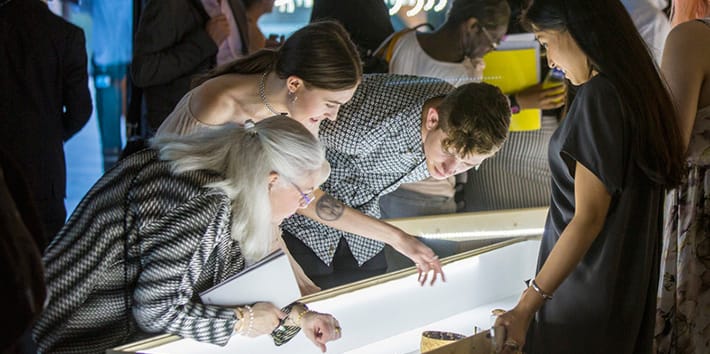
Our purpose and key goals
This strategic area requires us to place UAL at the centre of the debate about the future of arts, design, fashion and communication and to improve the way in which we engage with academic, cultural and business partners, both in the UK and across the world.
We will do this by:
- communicating clearly and effectively both internally and externally, encouraging increased collaboration between our colleges at all levels;
- strengthening academic relationships with other universities and institutions that have world-class reputations in our areas of expertise;
- creating closer connections with other disciplines, recognising the increasingly hybrid nature of arts, design, fashion and communication and their impact on other fields;
- building resilient partnerships at every scale from local communities to international networks, and using our creative expertise to empower others who would not otherwise have access to it;
- forging stronger links with our professional, cultural, academic and industry partners in relation to both research and enterprise.
Our strategic ambitions
Specific initiatives to help us to achieve these goals include:
- the implementation of new cross-University teams for both internal and external communication;
- increased participation in media debate around the arts and creative education which establishes UAL as an authoritative voice in our fields;
- a full review of our activities and relationships with alumni to support their engagement with UAL and our existing students whilst providing more opportunities for our alumni to benefit from their ongoing relationship with us;
- increased investment in international exchanges of staff and students and other academic collaborations with peer universities across the world, coordinated by UAL's new International Relations Unit.
Key performance indicators:
- Industry collaborations
- Academic partnerships
- Staff and student mobility
- Alumni engagement
Case study: Spatial Practices Rio project
Students and five professors from Spatial Practices joined local university students from PUC-Rio for a two week intensive project in Rio de Janeiro, Brazil, which was hosted at Studio X Rio. Students worked collaboratively with locally based architects and designers on a ‘live’ site to develop new primary school furniture for Jongo da Serrinha, an NGO dedicated to promoting culture and youth education as well as preserving the tradition of the Jongo, and afro-brazilian music and dance expression which is one of the roots of Samba.
The NGO is currently building a new headquarters, named Casa do Jongo (Jongo's House), where their activities will be concentrated. Therefore the objective is to produce creative low cost pieces, which respond to the specific needs, wants and requirements of the users that will occupy the various spaces located in and around the new headquarters. Designs and prototypes should respond to the idea of domesticity - as defined by Jongo da Serrinha - and be made from the reuse of locally sourced ready-made objects, combined with both traditional Brazilian construction techniques and digital fabrication methods.
The time was spent on both research and development work as well as production of 1:1 furniture prototypes, informed by research into Oscar Niemeyer's and Darcy Ribeiro's CIEP primary schools for school buildings to be opened up to the wider community. The work coincided with an exhibition about public education, which also featured the CIEPs at the Museu de Arte do Rio (MAR).
Find out more about our Spatial Practices programme.
Contact
Contact our Planning Unit to find out more about UAL's 2015-2022 strategy.
Email ualstrategy@arts.ac.uk
For all media enquiries:
press.office@arts.ac.uk
View a print version of the 2015-2022 strategy: